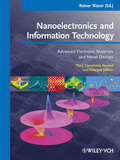Nanoelectronics and Information Technology
Advanced Electronic Materials and Novel Devices

3. Auflage April 2012
1040 Seiten, Hardcover
1000 Abbildungen (1000 Farbabbildungen)
Lehrbuch
Kurzbeschreibung
A full-colour introduction to advanced electronic materials and and device concepts for the major areas of information technology, outstanding in coverage and quality. This 3rd edition is substantially updated.
Jetzt kaufen
Preis: 99,90 €
Preis inkl. MwSt, zzgl. Versand
Euro-Preise für Wiley-VCH- und Ernst & Sohn-Titel sind nur für Deutschland gültig. In EU-Ländern gilt die lokale Mehrwertsteuer. Portokosten werden berechnet.
Fachlich auf höchstem Niveau, visuell überzeugend und durchgängig farbig illustriert: Das ist die neue Auflage der praxisbewährten Einführung in spezialisierte elektronische Materialien und Bauelemente aus der Informationstechnologie. Über ein Drittel des Inhalts ist neu, alle anderen Beiträge wurden gründlich überarbeitet und aktualisiert.
General Introduction
I FUNDAMENTALS
1 Dielectric, Ferroelectric, and Optical Properties
2 Electronic Properties and Quantum Effects
3 Mesoscopic Electron Transport
4 Spintransfer Phenomena in Layered Structures
5 Organic Molecules - Structures and Electronic Properties
6 Neurons - The Molecular Basis of Their Electrical Excitability
7 Logic Gates and Digital Circuits
II TECHNOLOGY AND ANALYSIS
8 Advanced Optical and Particle Beam Lithography
9 Nanoimprint Lithography
10 Structural and Chemical Characterization on the Nanoscale
11 Scanning Probe Analysis
12 Atomic and Molecular Manipulation
13 Bottom-Up Approaches by Self-Organization Techniques
III LOGIC DEVICES
14 Metal-Oxide-Semiconductor Field-Effect Transistors: Novel Materials and Alternative Concepts
15 Nanoelectromechanical Logic Gates
16 Single-Electron Devices for Logic Applications
17 Electron Waveguide Devices
18 Superconductor Digital Electronics
19 Spin-Based Logics - Principles and Concepts
20 Carbon Nanotubes and Graphene for Data Processing
21 Molecular Electronics - Functions and Features Arising from Tailor-Made Molecules
IV COMPUTATIONAL CONCEPTS AND ARCHITECTURES
22 Performance Estimates for Microprocessors: at Technology Limits and in Practice
23 Reconfigurable Nano-Crossbar Architectures
24 Cognitive Computing
25 Quantum Computing - Fundamentals and Solid-State Realizations
V MEMORY DEVICES AND STORAGE SYSTEMS
26 Flash Memories
27 Capacitor-based Random Access Memories
28 Magnetic Random Access Memories
29 Information Storage Based on Phase Change Materials
30 Redox-Based Resistive Random Access Memories
31 Scanning Probe Storage
32 Holographic Data Storage
VI DATA TRANSMISSION AND INTERFACES
33 Metal Interconnects
34 Three-Dimensional Integration
35 Photonic Networks
36 RF and Microwave Communication - Systems, Circuits and Devices
37 From RFID Tags to Nanomorphic Systems
38 Neuroelectronic Interfacing with Semiconductor Chips
VII SENSOR ARRAYS AND IMAGING SYSTEMS
39 Optical 3-D Time-of-Flight Imaging System
40 Micromachined Thermal Detector Arrays for Infrared Imaging
41 Electronic Noses and Tongues
42 2-D Tactile Sensors and Tactile Sensor Arrays
VIII DISPLAYS
43 Liquid Crystal Displays
44 Organic Light Emitting Devices
45 Plasma Displays
46 Micromirror Displays
47 Electronic Paper
Rainer Waser is Professor at the faculty for Electrical Engineering and Information Technology of the RWTH Aachen University and director at the Institute of Solid State Research (IFF) at the HGF Research Center Jülich, Germany. In 1984, he received his PhD in physical chemistry at the University of Darmstadt, and worked at the Philips Research Laboratory, Aachen, until he was appointed professor in 1992. His research group is focused on fundamental aspects of electronic materials and on such integrated devices as non-volatile memories, specifically ferroelectric memories, logic devices, sensors and actuators. Throughout, he has been collaborating with major semiconductor industries in Europe, the US, and the Far East. He has organized international conferences, published about 200 technical papers and holds ten patents. In 2000, Dr. Waser has been honored with the IEEE Ferroelectrics Recognition Award, and since 2002 he has been the coordinator of the research program Nanoelectronic Systems within the German National Research Centers (Helmholtz-Gemeinschaft).


